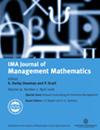A stochastic dominance approach to pension-fund selection
IF 4.3
3区 工程技术
Q3 MANAGEMENT
引用次数: 2
Abstract
This paper contributes to the research on multi-pillar pension systems with main focus on private pension funds (PFs). In this context, the specific objective of this study is to determine which second-pillar private fund is the best for participants in such systems on the basis of their risk profile. Based on the assumptions on utility functions of the participants in a pension scheme, four types of stochastic dominance (SD) relations are considered, specifically first order, second order, third order and SD generated by utility functions with decreasing absolute risk aversion. We conduct an analysis under two distributional assumptions: empirical and stable distribution of returns. Moreover, the investors for which non-dominated funds are the optimal choices are identified. Allowing for diversification, the efficiency of the PFs with respect to several types of SD is tested. Then, the observed behaviour of participants in the last quarter/year is compared to the results of SD analysis. Finally, the identified SD relations are stress-tested using data originating from a period of turmoil. Despite the focus on Lithuanian PFs, the methodology developed in this work can be employed by participants or PF managers in similar markets of other countries.养老基金选择的随机优势方法
本文致力于多支柱养老体系的研究,主要关注私人养老基金。在这种情况下,本研究的具体目标是根据参与者的风险状况,确定哪种第二支柱私人基金最适合此类系统的参与者。基于对养老金计划参与者效用函数的假设,考虑了四种类型的随机优势(SD)关系,即一阶、二阶、三阶和绝对风险厌恶度递减的效用函数产生的SD。我们在两个分布假设下进行分析:收益的经验分布和稳定分布。此外,确定了非主导型基金是最佳选择的投资者。考虑到多样化,测试了PFs对几种类型SD的效率。然后,将参与者在最后一个季度/年度观察到的行为与SD分析的结果进行比较。最后,使用源自动荡时期的数据对所确定的SD关系进行压力测试。尽管重点关注立陶宛PF,但其他国家类似市场的参与者或PF经理可以使用本工作中开发的方法。
本文章由计算机程序翻译,如有差异,请以英文原文为准。
求助全文
约1分钟内获得全文
求助全文
来源期刊

IMA Journal of Management Mathematics
OPERATIONS RESEARCH & MANAGEMENT SCIENCE-MATHEMATICS, INTERDISCIPLINARY APPLICATIONS
CiteScore
4.70
自引率
17.60%
发文量
15
审稿时长
>12 weeks
期刊介绍:
The mission of this quarterly journal is to publish mathematical research of the highest quality, impact and relevance that can be directly utilised or have demonstrable potential to be employed by managers in profit, not-for-profit, third party and governmental/public organisations to improve their practices. Thus the research must be quantitative and of the highest quality if it is to be published in the journal. Furthermore, the outcome of the research must be ultimately useful for managers. The journal also publishes novel meta-analyses of the literature, reviews of the "state-of-the art" in a manner that provides new insight, and genuine applications of mathematics to real-world problems in the form of case studies. The journal welcomes papers dealing with topics in Operational Research and Management Science, Operations Management, Decision Sciences, Transportation Science, Marketing Science, Analytics, and Financial and Risk Modelling.
 求助内容:
求助内容: 应助结果提醒方式:
应助结果提醒方式:


